By Gauri Patel
Staff Writer
Alexei Navalny, a Russian opposition figure and outspoken Kremlin critic, unexpectedly died on Feb. 16 at the Arctic prison where he was serving a 19-year prison term, according to Russia’s prison agency. The 47-year-old was one of Russian President Vladimir Putin's most prominent domestic foes and was known for his anti-corruption activism and fierce criticism of the government's policies.
According to Reuters, his death was announced by the prison service of the Yamalo-Nenets region where he had been serving his sentence. It reports that Navalny felt unwell after a walk, almost immediately losing consciousness. Medical staff of the institution and an ambulance arrived immediately, but he could not be revived. The causes of death are “being established," the announcement concludes. There is no immediate information about what led to his death, and the region’s investigative committee said it has launched a “procedural investigation.”
Navalny returned to Russia in 2021 from Germany, where he had been treated after being poisoned with Novichok, a Soviet-era nerve agent. He was later convicted by a Russian court three times, which he said was politically motivated, and received a sentence of 19 years for extremism. He has been incarcerated ever since, with longstanding concerns for his welfare growing more intense after he was transferred to the IK-3 penal colony in Kharp, known as the “Polar Wolf.”
The news of Navalny's death, occurring just weeks before an election is expected to give Putin another six years in office, prompted global condemnation and renewed scrutiny of Putin's authoritarian rule. President Joe Biden expressed his outrage at Navalny’s death in a speech, blaming Putin and warning that there would be consequences, according to Reuters.
"We don't know exactly what happened, but there is no doubt that the death of Nalvany was a consequence of something that Putin and his thugs did," Biden said. "Russian authorities are going to tell their own story, but make no mistake. Make no mistake: Putin is responsible for Navalny's death."
In his speech, Biden reaffirmed the importance of supporting Ukraine after two years have passed since Russia’s invasion, saying, “Let’s provide the funding so Ukraine can keep defending itself against Putin's vicious onslaught and war crimes,” referring to the billions in aid that have been held up in Congress for months.
The U.S. and the European Union have imposed sanctions on Russia over its invasion of Ukraine and the death of Navalny. The U.S. has imposed over 500 new sanctions that will target Russia’s defense, military and financial sectors as well as individuals connected to Navalny’s imprisonment. Additionally, the U.S. is imposing new export restrictions on nearly 100 entities for providing backdoor support for Russia’s war effort and is taking action to further reduce Russia’s energy revenues.
There were also questions about the location of Navalny’s body after his death was announced. When Navalny’s mother arrived at the penal colony, a prison employee informed her that the body was taken to the nearby city of Salekhard as part of a post-mortem investigation, according to Kira Yarmysh, Navalny’s spokesperson. They were later informed that the body was also not at the morgue in Salekhard.
Russia's Investigative Committee informed Navalny's team that the body would not be handed over to his relatives until investigations into the cause of death were completed, according to NPR. In Yarmysh’s perspective, Russian authorities were “lying and doing everything they can to avoid handing over the body.”
“Give us the body of my husband,” said Yulia Navalnaya, Navalny’s widow, according to The Associated Press. “You tortured him alive, and now you keep torturing him dead. You mock the remains of the dead.”
After Navalny’s family and supporters called on authorities to return the body for over a week, Navalny was finally returned to his mother.
Russian authorities have detained more than 400 people who came to pay respect to Navalny at monuments across 32 Russian cities, according to OVD-Info, a group that monitors political repression in Russia. Flowers and memorial items were continuously laid by protestors despite authorities' attempts to remove them. In St. Petersburg, more than 30 people were detained at a gathering after protesters laid flowers and candles and sang hymns, according to Reuters. In gatherings in other cities across the country, officers took pictures of those who came and wrote down their personal data in an intimidation attempt.
Navalny's death underscores the ongoing struggle for political freedoms and human rights in Russia, highlighting the challenges that lie ahead for the opposition movement.







